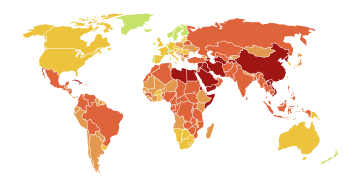
- Americas
- Countries
- Press releases
- Take action
Political transitions have mainly benefitted journalists from two countries in the Americas. In the south, in Brazil (92nd), the departure of President Jair Bolsonaro, who systematically attacked journalists and the media throughout term, has revived hopes of a return to normalcy in relations between the government and the press. The country moved up 18 places in the Index, a record for the continent. In the north, in the United States (down 3 at 45th), the Biden administration has also shown a much better disposition towards the media than the previous administration. Nonetheless, the country’s slight decline in the 2023 index was due to the continuing economic difficulties of the media, the murders of two journalists (Jeff German in 2022 and Dylan Lyons in 2023), and the end of efforts to support freedom of the press at the legislative level (the PRESS Act), as well as former President Donald Trump’s continued attacks on the media.
Elsewhere on the continent, the polarisation and institutional instability that characterise several countries in the region have fostered hostility and distrust of the media. The successive political transitions of the past six years in Peru (down 33 at 110th) have fuelled a general distrust towards both the country’s institutions and the media. In Haiti (down 29 at 99th), the growing political instability since President Jovenel Moïse’s assassination in 2021 has created an acute security crisis that has turned Haiti into one of the region’s most dangerous countries for journalists. In Ecuador (down 12 at 80th), the destabilisation of the country, due to the growing influence of criminal organisations, has also caused a significant deterioration of journalists’ working conditions. In Mexico (down 1 at 128th), the extreme violence of the cartels and their frequent collusion with local officials and politicians, has continued journalism’s destruction.
Disinformation and online violence
The situation has also deteriorated in countries where the political landscape is less unstable. The use of disinformation and propaganda, often associated with online verbal violence against journalists and the media, is being normalised and becoming an integral part of political leaders’ strategy in seeking greater control over the public narrative. Although historically well placed in the World Press Freedom Index, Costa Rica (down 15 at 23rd), Uruguay (down 8 at 52nd) and Argentina (down 11 at 40th) all reflect this trend’s impact on journalism. Canada (up 4 at 15th) and Guyana (down 26 at 60th) have also seen an increase in online harassment, particularly of women journalists.
Among the worst ranked countries, references to polarisation, stability, and national security continue to be used by authoritarian governments to justify all sorts of abuses against the media. In Nicaragua (up 2 at 158th), independent journalism has been forced underground or into exile. In Cuba (up 1 at 172nd), a new penal code has allowed the government to legally continue to intimidate and persecute journalists critical of the regime.
The countries
| Name | Index | Global score | Diff. score 2022 | Diff. position 2022 |
|---|---|---|---|---|
Argentina
|
40
|
73.36
|
-4
|
11
|
Belize
|
51
|
70.49
|
0
|
4
|
Bolivia
|
117
|
51.09
|
4
|
-9
|
Brazil
|
92
|
58.67
|
3
|
-18
|
Canada
|
15
|
83.53
|
2
|
-4
|
Chile
|
83
|
60.09
|
0
|
1
|
Colombia
|
139
|
45.23
|
3
|
-6
|
Costa Rica
|
23
|
80.2
|
-5
|
15
|
Cuba
|
172
|
29
|
2
|
-1
|
Ecuador
|
80
|
60.51
|
-4
|
12
|
United States
|
45
|
71.22
|
-1
|
3
|
Guatemala
|
127
|
48.12
|
1
|
3
|
Guyana
|
60
|
67.5
|
-9
|
26
|
Haïti
|
99
|
57.38
|
-7
|
29
|
Honduras
|
169
|
32.65
|
-2
|
4
|
Jamaica
|
32
|
75.89
|
-8
|
20
|
Mexico
|
128
|
47.98
|
0
|
1
|
Nicaragua
|
158
|
37.09
|
0
|
-2
|
OECS
|
93
|
58.36
|
-10
|
38
|
Panama
|
69
|
63.67
|
1
|
-5
|
Paraguay
|
103
|
55.96
|
-3
|
7
|
Peru
|
110
|
52.74
|
-9
|
33
|
Dominican Republic
|
43
|
71.88
|
-5
|
13
|
El Salvador
|
115
|
51.36
|
-3
|
3
|
Suriname
|
48
|
70.62
|
2
|
-4
|
Trinidad and Tobago
|
30
|
76.54
|
-2
|
5
|
Uruguay
|
52
|
70.33
|
-2
|
8
|
Venezuela
|
159
|
36.99
|
-1
|
0
|


.png?h=e72b40d1&itok=UlqKXlmo)
